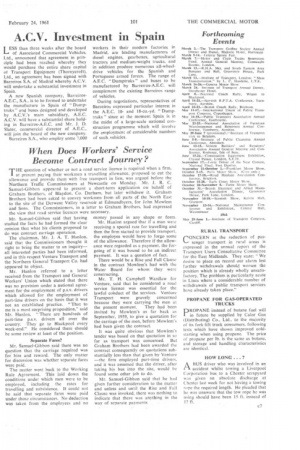When Does Workers' Service Become Contract Journey?
Page 53

If you've noticed an error in this article please click here to report it so we can fix it.
HE question of whether or not a road service licence is required when a firm,
at present paying their workmen a travelling allowance, proposed to cut the allowance and provide them with free transport in lieu, was argued before the Northern Traffic Commissioners at Newcastle on Monday. Mr. J. R. C. Samuel-Gibbon appeared to present a short-term application on behalf of Graham Brothers, of Blaydon. Co. Durham, but later withdrew it. Graham Brothers had been asked to convey workmen from all parts of the North East to the site of the Derwent Valley reservoir at Edmundbyers, for John Mowlem and Sons. The Commissioners, in a letter to Graham Brothers, had expressed the view that road service licences were necessary.
Mr. Samuel-Gibbon said that having studied the facts he had formed the clear opinion that what his clients proposed to do was contract carriage operation.
The chairman, Mr. J. A. T. Hanlon, said that the Commissioners thought it right to bring the matter to an inquiry— all interested parties had been informed, and in this respect Venture Transport and the Northern General Transport Co. had appeared to object.
Mr. Hanlon referred to a letter received from the Transport and General Workers' Union which stated that there was no provision under a national agreement for the employment of p.s.v. drivers which allowed for the employment of part-time drivers on the basis that it was not an established practice. "That to me is a most surprising proposition," said Mr. Hanlon. 'There are hundreds of part-time p.s.v. drivers all over the country. They go to Blackpool every week-end." He considered there should be some review at least of the position.
Separate Fares?
Mr. Samuel-Gibbon said there was no question that the carriage required was for hire and reward. The only matter for discussion was whether separate fares were paid.
The matter went back to the Working Rule Agreement. This laid down the conditions under which men were to be employed, including the rates for travelling and subsistence. It could not be said that separate fares were paid under those circumstances. No deduction was taken from the employees and no money passed in any shape or form.
Mr. Hanlon argued that if a man were receiving a special rate for travelling and then the firm started to provide transport. the employee would have to forgo some of the allowance. Therefore if the allowance were regarded as a payment, the forgoing of it was bound to be an indirect payment. It was a question of fact.
There would be a Rise and Fall Clause in the contract Mowlem's had with the Water Board for whom they were constructing.
Mr. T. H. Campbell Wardlaw for Venture, said that he considered a road service licence was essential for the lawful conduct of the services. Venture Transport were gravely concerned because they were carrying the men at
the present moment. They had been invited by Mowlem's as far back as September, 1959, to give a quotation for the carriage of the men, before Mawlem's had been given the contract.
It was quite obvious that Mowlem's tender was based on that quotation in so far as transport was concerned. But Graham Brothers had been awarded the contract consequently on quotations substantially less than that given by Venture —the firm employed part-time drivers, and it was assumed that the driver, after taking his bus into the site, would be found some other job to do.
Mr. Samuel-Gibbon said that he had given further consideration to the matter and unless and until the Rise and Fall Clause was invoked, there was nothing to indicate that there was anything in the way of separate payments




































































































































































